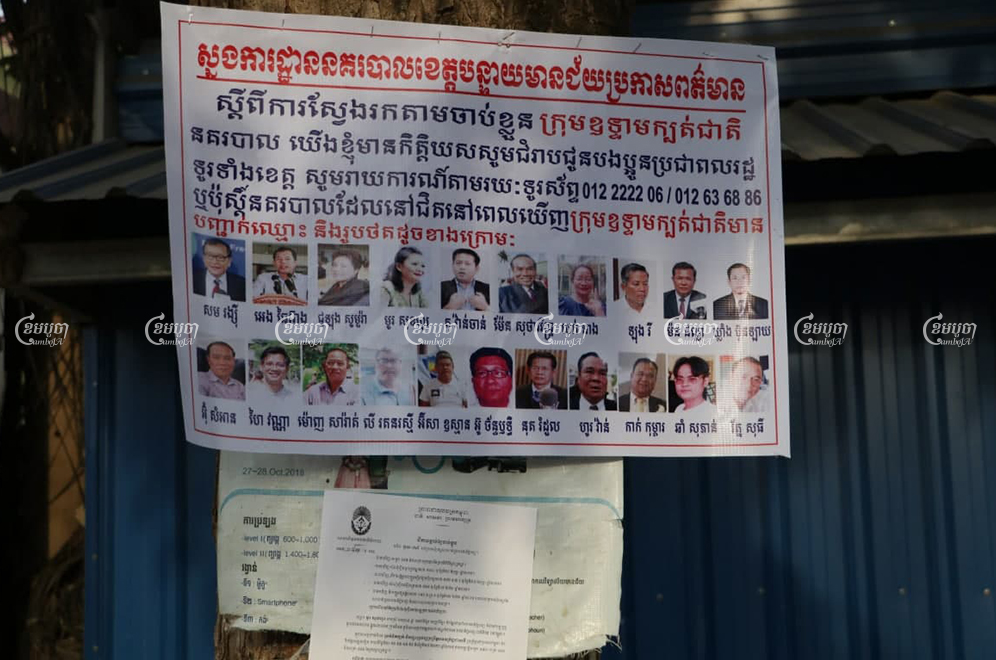Nine leaders of the outlawed Cambodia National Rescue Party should receive the maximum 30-year prison sentence for attempting an attack on the government through an alleged coup d’etat in 2019, a prosecutor and government attorney told the Phnom Penh Municipal Court on Tuesday.
Social media messages calling for people to take a stand against and the government of Prime Minister Hun Sen and pledges to pay military personnel to defect had crossed a democratic red line, they said, in the final hearings of the trial of the nine leaders, who are in exile and were tried in absentia.
“All these words and messages are appeals for the armed forces and people to topple the government,” government attorney Koun Saroeun told the court. “If authorities did not prevent this, Cambodia would have turmoil and instability.”
“We ask the court to deliver extreme penalties to those nine defendants,” he said, calling for each to be made to pay 200 million riel on top of the prison term, which is between 15 and 30 years under article 451 of the criminal code.
Sam Rainsy, Eng Chhay Eang, Mu Sochua, Ou Chanrith, Ho Vann, Long Ry, Men Sothavrin, Tiolung Saumura and Nuth Romduol stand accused of plotting a coup against the government of Prime Minister Hun Sen in November 2019, when they had pledged to return to Cambodia and “restore democracy.”
The trial and charges have been widely condemned alongside a series of parallel trials against opposition leaders, members and supporters, in which some of the nine also stand accused – all linked Rainsy’s plan to return, which was thwarted after the government placed travel bans and asked airlines not to allow him to board flights to Cambodia.
Social media messages and a meeting between opposition leaders in the United States were presented as evidence of the attempt to overthrow the world’s longest-serving prime minister.
“All theses points show elements of an attack with the ill-intention to topple the government – that is crossing a democratic red line,” deputy prosecutor Seng Hieng told the court.
“The army is a sensitive issue for the government, especially demoralisation of the army,” he said, referring to the danger of “color revolutions” and calling for “extreme” penalties for the nine defendants.
CNRP officials and affiliates have been under fire since the party was dissolved by the Supreme Court in 2017 after having made significant gains in the most recent national and commune elections.
With Rainsy already out of the country and with criminal charges stacking up against him, co-leader Kem Sokha was arrested in a nighttime raid on his Phnom Penh home and detained in solitary conferment, charged with treason.
The opposition’s top 118 officials were banned from politics for five years and dozens who held dual citizenship had their Cambodian passports revoked, including CNRP deputy president Mu Sochua, who campaigned unsuccessfully to be allowed back into Cambodia to face the court.
“The weaponization of the justice system in Cambodia … to dissolve a strong and viable opposition is detrimental to real peace and justice,” Sochua told CamboJA from the United States in Tuesday. “It must be prevented and condemned with firm and coordinated actions and sanctions.”
Human Rights Watch has called the recent round of charges and trails of CNRP figures “bogus” while Amnesty International said they were “the culmination of a relentless campaign of persecution.”
Defense lawyer Sam Sokong said the court should drop all charges against his clients, reasoning that a raft of social media posts and messages was not “solid evidence” of an attempted coup.
He also challenged the charge of “attacking” the government, which he said should consist of one or more acts of violence liable to endanger the institutions of the state or violate the integrity of its territory.
“The only evidence we have seen is messages and video clips; my clients aren’t even present to prove whether they are real or not,” he said.
“The evidence that has been extracted is not involved with [crime]; they are political messages. Usually, in a democratic country, the opposition is able to raise opinions that are opposite to the ruling party.”
The court will deliver its verdict on February 23.








